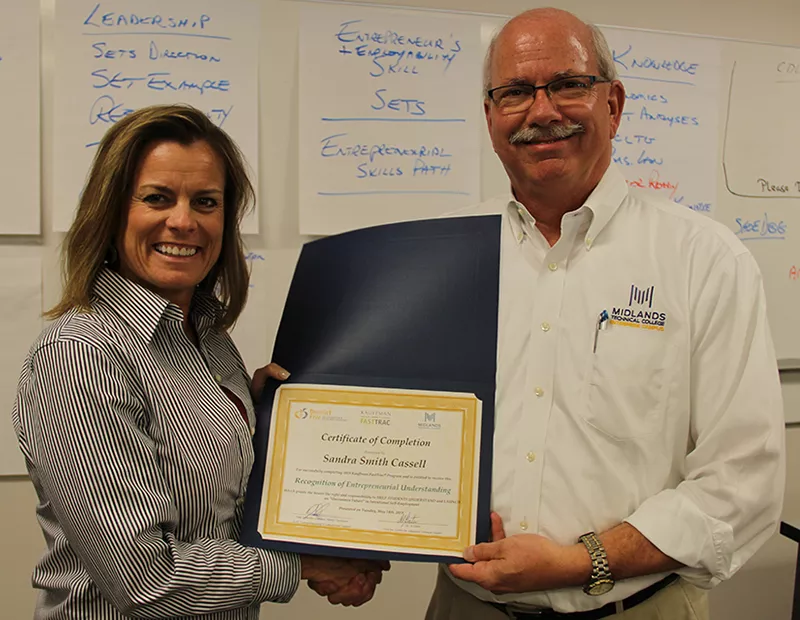News
Turning Big Ideas into the American Dream
Jul 09, 2019

Career Specialist Sandra Smith Cassell celebrates the completion of her entrepreneurial training with Tom Ledbetter.
Being a successful business owner has been the “American Dream” for many individuals, but Tom Ledbetter, MTC’s Associate Vice Provost for Entrepreneurship and Educational Support, says communities across the country are beginning to see the value of growing their own entrepreneurs to make sure the local economy is able to keep pace with the future.
“We are entering a time in history when the successful mindset is going to include being in business for yourself,” Ledbetter said. “At MTC, we are currently in front of the curve.”
In an effort to reach the next generation of potential entrepreneurs, Ledbetter held a three-day seminar for school counselors and career specialists from Lexington-Richland School District 5.
“My challenge to them,” he said, “is what are you doing to keep yourself current with the careers that are out there? There are a lot of job areas that may not last. There is a new move toward efficiency and reorganization, and ten years from now a lot of people might find themselves looking to become self-employed.”
Ledbetter said he wants to see high school students and others with the entrepreneurial mindset look toward “intentional self-employment,” rather than someone out of work trying to start a business as a last resort.
“We need some training on this,” said Career Specialist Sandy Ellisor. “I really didn’t know how to talk to a student about becoming an entrepreneur. I needed to learn how to start that conversation and point them in the right direction.”
Dr. Martin Cwiakala, an instructor at the district’s Center for Advanced Technical Studies, said every semester he has one or two students who have the desire and the potential to start a business. Sometimes they already have.
“One young man had chickens and made money delivering fresh eggs,” he said. “Another bought a drone and got certified on how to operate it. Now he can work with real estate agents on aerial photography.”
Cwiakala’s capstone class is in engineering design and development. He describes it as an “invention class” where students work in groups, identify a problem, come up with potential solutions, and present it to an advisory committee.
“These are students with big ideas,” he said. “I am going to incorporate some of what I've learned in this class to talk to students about the entrepreneurial possibilities. I didn’t know MTC offered a certificate in entrepreneurship. Now, when I come across students who could use more formal training, I can direct them toward that.”
Ledbetter said helping school counselors spread this opportunity to high school students is the main goal he wanted to achieve with the seminar. Now he hopes to spread it further.
“There is a demand in our service area for young self-starters with good business ideas,” he said. “MTC is actively engaged with our school districts on this initiative. We have 30 high schools in the college’s service area. So how do we take the whole idea of entrepreneurial success and inject it across the curriculum? I think it is important for every student to take at least one course in the fundamentals.
“There is a presence now called entrepreneurship, and it is approachable by anybody across the educational spectrum,” Ledbetter continued. “Anybody can be trained to be in business for themselves. Entrepreneurs are not born; they are made. But we need to start identifying them in high school and helping them as early as possible.”
For more information about bringing entrepreneurial training to your high school or for training for yourself, visit MTC’s Center for Entrepreneurial Success at MIDLANDSTECH.EDU.